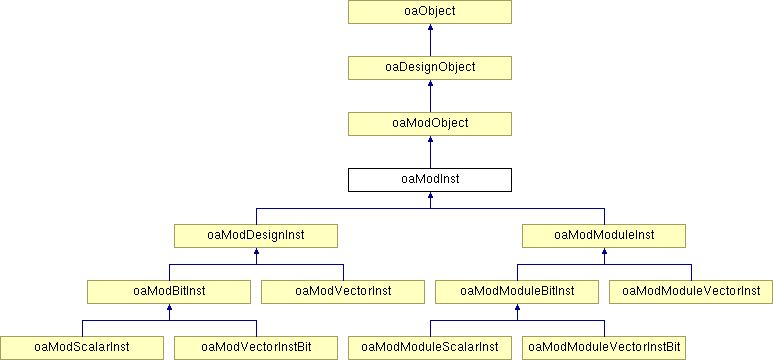 |
 |
 |
||||||
Inheritance diagram for oaModInst:

 |
 |
Public Methods | |
| void | destroy () |
| oaModule * | getMasterModule () const |
| void | getName (oaSimpleName &name) const |
| void | getName (const oaNameSpace &ns, oaString &name) const |
| oaUInt4 | getNumBits () const |
| oaBoolean | isBound () const |
| oaBoolean | isImplicit () const |
| oaBoolean | isModDesignInst () const |
| oaBoolean | isModModuleInst () const |
| oaBoolean | usesTermPositions () const |
| void | scalarize () |
| oaCollection< oaModInstTerm, oaModInst > | getInstTerms (oaUInt4 filterFlags=oacInstTermIterNotImplicit) const |
| oaCollection< oaModAssignment, oaModInst > | getAssignments () const |
| oaCollection< oaOccInst, oaModInst > | getOccInsts (const oaOccurrence *top) const |
Static Public Methods | |
| oaModInst * | find (const oaModule *module, const oaSimpleName &name) |
Public Types | |
| enum | { dtIndex = oacInstDataType } |
oaModInst objects are always in the module domain. An oaModInst can have an equivalent oaInst in the block domain and will always have an equivalent oaOccInst in the occurrence hierarchy.
Note that oaModInst::getOccInsts will return oaOccInsts only if the occurrence hierarchy has been expanded to include those objects. See Working in the Occurrence Domain for more details.
Instances can create hierarchical designs. The master of an instance can contain instances of other masters. This hierarchy can continue for as many levels as needed to express a complete design.
All instances have names. These names can be assigned by the creator. For scalar modules, instance names can be automatically assigned by the database.
Module instances always have an InstHeader, which contains the attributes that are constant for all instances of a given master module. However, the InstHeader class for oaModModuleInsts is oaModModuleInstHeader and the InstHeader class for oaModDesignInsts is oaModInstHeader. An oaModModuleInstHeader collects all the same oaModModuleInsts for a given parent module, while an oaModInstHeader collects all of the same oaModDesignInsts across an oaDesign for all parent modules.
Instances of pCells include a set of parameter values used to tailor the pCell for each specific instance.
The oaModInst class can be observed by deriving from oaObserver<oaModInst>.
|
|
Removes this modInst from the database. If this was the last instance of the module or design that is its master then the oaModInstHeader that it belongs to is destroyed as well. |
|
||||||||||||
|
This function searches the specified module for an instance with the specified name. If the name is hierarchical, then this function searches for the instance as specified in the hierarchical path name. If found, the instance is returned. Otherwise, NULL is returned.
|
|
|
This function returns a collection of module assignments associated with this instance. |
|
|
This function returns a collection of module instTerms associated with this instance.
|
|
|
This function returns the master module of this instance. NULL is returned if the module master can not be bound. |
|
||||||||||||
|
This function fills out name with the name of this instance. The name is mapped according to the specified nameSpace.
|
|
|
This function fills out name with the name of this instance.
|
|
|
This function returns the number of bits of this instance. This function always returns '1' for scalar and array instances. The function can return '1' or more for vector instances. |
|
|
This function returns a collection of occurrence instances associated with this instance in the design hierarchy under the specified 'top' occurrence. It is an error if the specified top occurrence is not in the same design as this module instance is in. |
|
|
This function returns a boolean value indicating whether this instance is currently bound to its master. An instance is bound to its master if some traversal is made from the instance to the master or an object in the master. If the instance is bound, then its master is in memory and the linkage from the instance to the master is established.
|
|
|
This function returns a boolean value that indicates if this instance is implicit, having been automatically created as a result of the creation of a vectorInst. |
|
|
This function determines if this object is an instance of one of the classes derived from the oaModDesignInst class. The function returns a boolean value of true if the oaModInst is an oaModDesignInst. |
|
|
This function determines if this object is an instance of one of the classes derived from the oaModModuleInst class. The function returns a boolean value of true if the oaModInst is an oaModModuleInst. |
|
|
This function insures that the bitInsts associated with this instance have been promoted to the explicit state so that they can support implementation data. If this instance is a multibit instance, this function insures that all constituent bitInsts are promoted to the explicit state. The multibit instance is then demoted to the implicit state so that no implementation data can be associated with it. When an instance is demoted to the implicit state, associated implementation data is removed from it. When an instance is scalarized, all of its connections are also scalarized. Each bit of any multi-bit connection associated with the instance is promoted to the explicit state and is available for editing.
|
|
|
This function returns a boolean indicating how connections to this instance have been made. If the instTerms associated with this instance connect to terminal positions, this function returns true. Otherwise, this function returns false. Note that if the collection of instTerms for this instance is empty, this function will also return false. |
|
|
|

Copyright © 2002 - 2010 Cadence Design Systems, Inc.
All Rights Reserved.